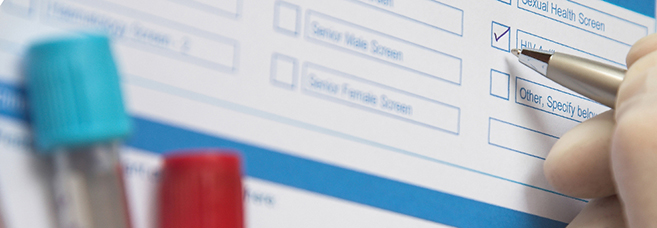
Need To Get Tested?
The following behaviors increase the chances of contracting HIV. If you answer yes to any of them, you should definitely get tested for HIV. If you continue with any of these behaviors, you should be tested every year.
• Have you injected drugs or steroids or shared needles or syringes with others?
• Have you had sex (vaginal, anal) without protection with men or women who have multiple sex partners or anonymous partners?
• Have you had unprotected sex with someone who could answer yes to any of the above?
If you've had sex with someone whose history of sexual partners and / or injecting drug use is unknown there is a higher chance to be infected with HIV.
For women planning to become pregnant, testing is even more important. If a woman is infected with HIV, medical care and certain medications given during pregnancy can reduce the probabilities of passing HIV to your baby. All women who are pregnant should be tested during pregnancy.
Why should you get tested for HIV?
In Ontario, 30,800 people (25,016 men, 4,622 women and 1,162 unknown) were diagnosed with HIV in November 1985 to December 2009 according to: THE HIV / AIDS IN ONTARIO: PRELIMINARY REPORT, 2009 Robert S. Remis, MD, MPH, University of Toronto, Carol Swantee BSc, HIV Laboratory, John Liu MSc, University of Toronto - June 2011.
And it is presumed that 252.000 to 312.000 people are also infected, but they do not know they are HIV-positive yet. These people haven’t got tested and that is why they do not know they are infected, these individuals may benefit from medical care if diagnosed on time. They can also be transmitting HIV to others without knowing it.
Latinos Positivos Toronto (LPT) recommends those at risk for HIV get regularly tested. Getting tested for HIV antibodies is a personal decision and only you can make this decision. Things to consider, why you should get tested:
• Knowledge is power.
• If you find out that you are HIV positive (infected with HIV), you and your health care provider can plan interventions and early treatment, and improve your chances of delaying progression of HIV disease.
• If you get a negative result, you may feel less anxious.
• If you find out your status is HIV-positive, you will learn what precautions you should take to take care of yourself and prevent transmission to others.
• Whatever the outcome, taking the test increases your commitment to good health habits. If it’s a HIV-positive result, you can learn more about HIV and take charge of your health care.
• If you are considering having a baby, you can take advantage of treatments that could prevent HIV transmission to the baby.
What is the antibody test for HIV?
As the body fights HIV, the immune system develops antibodies against the virus. The antibody test for HIV does not measure or detect the virus, but it detects the body's reaction to the virus (the presence of anti-HIV). For more information on HIV testing, visit The Body.
Where can I get tested?
Anonymous testing sites in Toronto:
340 College Street, Suite 375
416-928-9777
New Heights Community Health Centre (formerly Lawrence Heights Community Health Centre)
12 Flemington Rd.
416-787-1661 ext. 278
Parkdale Community Health Centre
1229 Queen Street West
416-537-2455
Sages Femmes Rouge Valley Midwives
6758 Kingston Road, Unit 6
905-409-6447 y 416-286-2228
Women’s Health in Women’s Hands
2 Carlton Street, Suite 500
416-593-1815 clinic
225 Queen Street East
416-360-0486
Bay Centre for Birth Control at the Women’s College Hospital
790 Bay St, 8th Floor
416-351-3700
Birth Control and Venereal Disease Information Centre
960 Lawrence Avenue west, 4th floor Suite 403
416-789-4541
Central Toronto Community Health Centres — Queen West Site
168 Bathurst Street
416-703-8482
22 College Street
416-922-2672
Gerrard Street East, Second Floor
416-922-0566 (women’s clinic) or 416-922-0603 (men’s clinic)
Rexdale Community Health Centre
8 Taber Road
416-744-0066
For more information on other places and websites in Ontario contact the Ontario Ministry of Health and Long-Term Care, to the toll-free number at 1.866.532.3161. You can request Spanish assistance.
If you have any questions about where to get tested, or if you need support with this decision, call us at 416-5060-1400 X 109 and make an appointment to speak with a volunteer on our peer counselling program.





